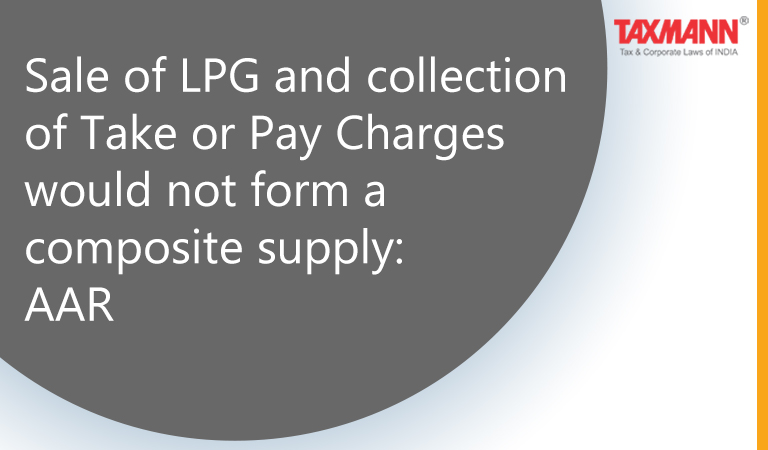Sale of LPG and collection of Take or Pay Charges would not form a composite supply: AAR
- Blog|News|GST & Customs|
- 2 Min Read
- By Taxmann
- |
- Last Updated on 28 October, 2021

Case details: Authority for Advance Rulings, Telangana SHV Energy (P.) Ltd., In re - [2021] 131 taxmann.com 208 (AAR- TELANGANA)
Judiciary and Counsel Details
-
- B. Raghu Kiran and S.V. Kasi Visweshwar Rao, Member
Facts of the Case
The applicant was engaged in business of sale of LPG to industrial customers. It entered into LPG supply agreement with industrial users for longer period ranging from 5 to 10 years. As per agreement, a minimum quantity of LPG had to be necessarily purchased by buyer and if such minimum amount would not be purchased, they shall pay by way of commitment charges i.e., ‘Take or Pay’ Charges of such shortfall in quantity. The applicant filed an application of advance ruling to determine whether sale of LPG and ‘Take or Pay’ charges together would form a composite supply.
AAR Held
The Authority for Advance Ruling observed that ‘Take or Pay’ contract is a contract which requires the buyer to either purchase and receive a minimum amount of product at a set price (“take”) or pay for this minimum without taking immediate delivery(“pay”). ‘Take or Pay’ clauses in a contract ensure compensation for the seller in the event buyer does not purchase a specified quantity of goods or services in the course of a continuous supply. The ‘Take or Pay’ Charges will be evidently compensation for breach of contract and a penalty stipulated to be paid to the applicant by his buyer for not purchasing the minimum quantity specified in the agreement. These charges would come into existence only when there shall be no supply of LPG. Therefore, it would mean that supply of LPG and ‘Take or Pay’ Charges shall be mutually exclusive and can never exist together and it would not be treated as composite supply.
List of Cases Referred to
-
- Diebold Systems (P.) Ltd. v. CST [2008] 12 STT 346 (Chennai – CESTAT) (para 6)
- Kone Elevators India (P.) Ltd. v. CST [2009] 20 STT 447 (Chennai – CESTAT) (Para 6)
- Kingfisher Training & Aviation Services Ltd. v. CCE [Stay Order Nos. S/653-654/2013-WZB/C-1 (CSTB), dated 21-3-2013] (para 6)
- Nikhil Comforts, In re [2020] 122 taxmann.com 14 (AAAR – Mah.) (para 6)
- Mfar Hotels & Resorts (P.) Ltd., In re [2020] 120 taxmann.com 442 (AAR – Tamilnadu) (para 6)
- Marco Media Digital Imaging (P.) Ltd., In re [2020] 120 taxmann.com 411/[2021] 83 GST 344 (AAR – Tamilnadu) (para 6)
- Ambara, In re [2020] 120 taxmann.com 369/[2021] 83 GST 495 (AAR – Karn.) (para 6)
- NEC Technologies India (P.) Ltd., In re [2020] 117 taxmann.com 571/82 GST 628 (AAR – Guj.) (para 6)
- Doctors Academy of Educational Society, In re [2020] 121 taxmann.com 187 (AA-GST-A.P.) (para 6)
- Aquaa Care (Surat) RO Technologies (P.) Ltd., In re [2020] 120 taxmann.com 167 (AAR – Guj.) (para 6)
- Torrent Power Ltd., In re [2019] 101 taxmann.com 303 (Guj.) (para 6)
- Nr Energy Solutions India (P.) Ltd., In re [GST-ARA-83/2018-19/B-03, dated 8-1-2019] (para 6)
- Khedut Hat, In re [2018] 98 taxmann.com 136/70 GST 779 (AAR – Guj.) (para 6)
- Radhey Krishna Technobuild (P.) Ltd., In re [Stay Order Nos. S/653-654/2013-WZB/C-1 (CSTB), dated 21-3-2013] (para 6)
- Abott Health Care (P.) Ltd. v. CST [2020] 74 GSTR 37 (Ker.) (para 7)
- Dr. Mahesh Chandra Sharma v. Smt. Raj Kumari Sharma AIR 1996 SC 869 (para 7).
Disclaimer: The content/information published on the website is only for general information of the user and shall not be construed as legal advice. While the Taxmann has exercised reasonable efforts to ensure the veracity of information/content published, Taxmann shall be under no liability in any manner whatsoever for incorrect information, if any.

Taxmann Publications has a dedicated in-house Research & Editorial Team. This team consists of a team of Chartered Accountants, Company Secretaries, and Lawyers. This team works under the guidance and supervision of editor-in-chief Mr Rakesh Bhargava.
The Research and Editorial Team is responsible for developing reliable and accurate content for the readers. The team follows the six-sigma approach to achieve the benchmark of zero error in its publications and research platforms. The team ensures that the following publication guidelines are thoroughly followed while developing the content:
- The statutory material is obtained only from the authorized and reliable sources
- All the latest developments in the judicial and legislative fields are covered
- Prepare the analytical write-ups on current, controversial, and important issues to help the readers to understand the concept and its implications
- Every content published by Taxmann is complete, accurate and lucid
- All evidence-based statements are supported with proper reference to Section, Circular No., Notification No. or citations
- The golden rules of grammar, style and consistency are thoroughly followed
- Font and size that’s easy to read and remain consistent across all imprint and digital publications are applied



 CA | CS | CMA
CA | CS | CMA
